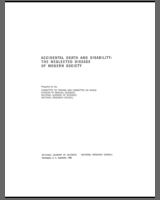NCBI Bookshelf. A service of the National Library of Medicine, National Institutes of Health.
National Academy of Sciences (US) and National Research Council (US) Committee on Trauma; National Academy of Sciences (US) and National Research Council (US) Committee on Shock. Accidental Death and Disability: The Neglected Disease of Modern Society. Washington (DC): National Academies Press (US); 1966.

Accidental Death and Disability: The Neglected Disease of Modern Society.
Show detailsThe courtroom sequelae of accidents are often, perhaps generally, dealt with in a manner below the general standards of the medical and legal professions. The courts for settlements of disability claims in some areas are provided with inadequate or inexpert evidence, and judgment may well reflect response to social, emotional, or political pressures, rather than to sound medical testimony. In this respect both lawyers and physicians for the claimants and for the defending insurance companies too often produce prejudiced medical testimony, diametrically and predictably contradictory. “Expert medical testimony” under these circumstances has commonly lacked clinical expertise. A system has been adopted by the judiciary in a number of localities to provide impartial evaluation of disability by a panel of physicians who are expert in their given fields and paid either by the court or jointly by the parties involved. This mechanism has proved to be of great value, and should be more universally employed. It is imperative that the physician’s role be uninfluenced by socioeconomic pressures.
In the final analysis, compensation for disability is a drain on every citizen through federal taxation, withholdings from earnings, and the increasing upward spiral of premiums on disability insurance. All these costs could be reduced if the demonstrated fairness and objectivity in categorizing degrees of disability employed by the Armed Forces and the Veterans Administration were applied by the medical profession and the courts to persons disabled by accidental injury or disease. In the military services, processing begins at the time a member incurs an injury or disease that may be temporarily or permanently disabling. Findings are referred by a medical committee to a physical evaluation board and reviewed at the highest levels, with the benefit of counsel at all stages, providing an objective determination of degrees of disability to serve as a basis for compensation. Society concurs in the fairness of this system and the care with which the Veterans Administration and the Armed Forces protect the rights of the nearly 2,000,000 persons who receive service-connected disability compensation among the 21,800,000 veterans of military service. 11 The same objectivity and fairness can be applied to the rest of the population through optimal medical care to prevent disability, a hospital trauma committee to judge disability, and impartial medical panels to serve the courts. Systems for rapid and uniform processing and compensation of the injured with minimal recourse to the courts should be applied nationally.
Forensic medicine constitutes a medical specialty of high order and only when a sufficient number of specialized physicians are available to carry out this work will important information, now needed, become available. Unfortunately, most coroners in this country are political appointees, mostly laymen, frequently funeral directors; but this situation is being gradually corrected by establishment of medical examiner systems in several cities, some counties, and a few states. Progress in this area must be accompanied by the training of more pathologists in forensic medicine.
With the expansion of the role of the medical examiner, implementation of a uniform code for reporting accidents and accidental deaths, and mandatory autopsy of fatal cases, to include tests for alcohol and drugs, an opportunity exists to study effectively the specific causes and mechanisms of injury of all magnitudes and to establish base lines against which to measure the efficacy of control measures.
RECOMMENDATIONS
- 1.
Judicial application of the principle of seeking impartial medical advice in the determination of disability.
- 2.
Replacement, on a national scale, of lay coroners by medical examiners who are not only physicians but also qualified pathologists experienced in medicolegal problems.
- MEDICOLEGAL PROBLEMS - Accidental Death and Disability: The Neglected Disease of...MEDICOLEGAL PROBLEMS - Accidental Death and Disability: The Neglected Disease of Modern Society
Your browsing activity is empty.
Activity recording is turned off.
See more...